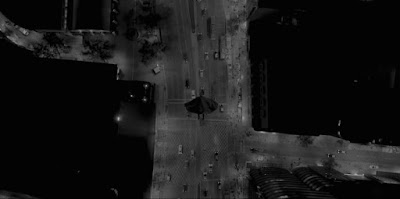or
"It's Said That When One Samples the Succulent Muscle of a Still Palpitating Heart, It's Hard To Go Back To Being a Normal Person."
Political satire can be very heavy-handed.
But, then, so can vampire movies.
Chilean director Pablo Larrain—he made the bio-pics Spencer and Jackie—now has a new film which combines the two and brings him a little closer to home. El Conde—which translates to "The Count"—imagines Chilean dictator Augusto Pinochet as a vampire, secreted away after faking his own death, and preparing for succession.
Obviously, we're not talking about a film with a strict adherence to the truth, or even to vampire lore—vampires in El Conde have no problems with sunlight (not even a sunburn, although one can't tell anything about pigment as the film is in black and white)—but, instead, is a horror-fantasy using historical figures for dramatic purposes. After all, Bram Stoker used Vlad Tepes as his model for his "Dracula", which might have inspired Larrain in the first place. Of course, liberties were taken because when have facts ever gotten in the way of a good story. Not on film, anyway.
Larrain starts his film far in the past in 18th Century France, creating a fictitious origin story for Pinochet, starting with him as a vampiric French soldier named Claude Pinoche, who, at the time of the French Revolution, deserts—and after witnessing the beheading of Marie Antoinette (he can't resist licking the guillotine blade as royal blood is so tasty). He fakes his own death—using the means at his disposal—and then travels across Europe, joining respective militaries and suppressing any revolutions by the common people, until he makes his way to Chile, where he rises in the ranks to dictator after helping overthrow the communist government of Allende in 1973. As per history, Pinochet stepped down in 1990, remained Commander-in-Chief of the Army until 1998, but was arrested in London for human rights violations. He was returned to Chile in 2004 citing his ill health, where he still faced trial for atrocities, tax evasion and embezzlement and died in 2006.Or did he?
Larrain maintains that Pinochet stopped privately drinking blood in order to weaken himself and "die" before a watching populace, whereupon after a state funeral, free from prosecution, he "retired" to a remote farmhouse compound (complete with guillotine for nostalgia's sake) for the occasional "fly" into town where he would swoop in and carve the heart out of someone's chest, put it in a blender (chop or puree, I wonder? Then a couple of quick pulses) and help himself to a "cardiac smoothie".But now, Pinochet (played by Jaime Vadell) has lost the will to live and makes plans to actually die, leaving the estate to his wife, Lucia (Gloria Münchmeyer). His children, Luciana (Catalina Guerra), Mercedes (Amparo Noguera), Jacinta (Antonia Zegers), Anibal (Marcial Tagle) and Manuel (Diego Muñoz) all worry that their inheritance will be at risk, so they arrange a visit to Mom and Dad. But, before they do, they contact the Roman Catholic Church and arrange that a saintly nun, Carmen (Paula Luchsinger), visit the compound under the guise and conducting an audit, but with the real intention of performing an exorcism on their father and dispatch him with a stake.
That's the plan, anyway. But, one doesn't live 250 years and become an international despot without learning a few tricks of survival, and things don't go exactly as the kids plan. For someone else is playing a longer game than Pinochet—the iron-willed person (Stella Gonet) who is narrating the story, and makes a grande entrance about half-way through.Oh, it's weird...and it's grisly (I mean, he's a vampire AND a South American dictator)...and (as I said) a bit heavy-handed. And it's rather gorgeously photographed (by Edward Lachman). For all the shivery aspects of it—there's a particularly nasty part where young Claude Pinoche pummels the face of a prostitute plotting to kill him with a mallet—there are the odd beauties as well, including one rapturous sequence where a newly fanged vampire takes flight and it feels like a free-form ballet that is just lovely. But, it also, at times, veers dangerously close to camp, which will kill a vampire flick faster than a stake through the heart.One blanks when thinking about how one could improve it—maybe excising the second half complication that seems like its gilding one too many lillies (except that it's so deliciously perverse)—but then, Larrain was marching down a dangerous road to begin with, and probably should be glad that the individuals portrayed are too dead to take him to court for slander.








No comments:
Post a Comment